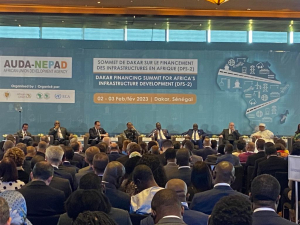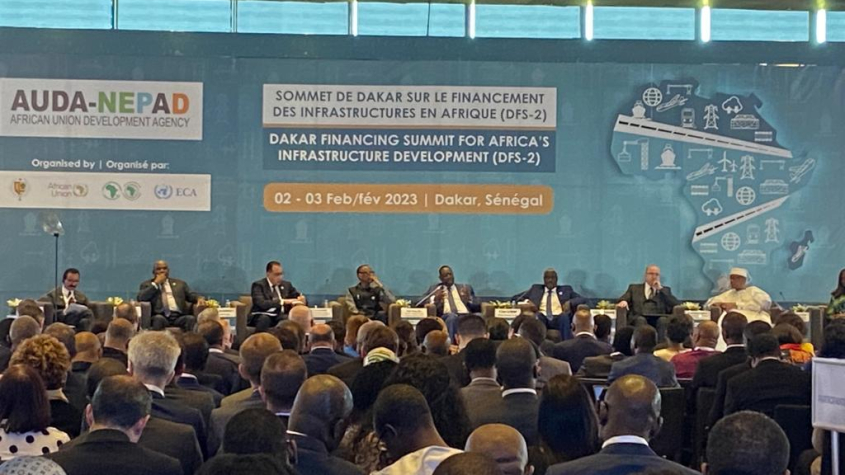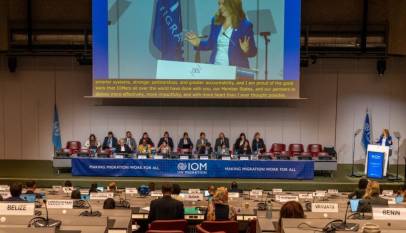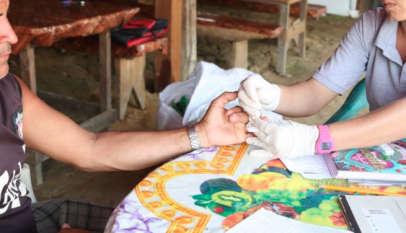DFS-2: African leaders offer pathway to continent’s infrastructure development
African leaders at last week’s 2nd Dakar Financing Summit for Infrastructure Development (DFS-2) proffered various strategies for accelerating the continent’s infrastructural development.

The 2nd Dakar Financing Summit for Africa’s Infrastructure Development (DFS-2) was hosted by the Chairperson of the African Union, Senegalese President Macky Sall under the theme “Maintaining the momentum towards world-class infrastructure in Africa.” It sought to facilitate public-private funding for key regional infrastructure projects under the Programme for Infrastructure Development in Africa (PIDA), the strategic masterplan for transforming Africa’s infrastructure.
DFS-2 focused on the 2nd PIDA Priority Action Plan (PIDA PAP 2), a basket of 69 projects with a projected investment requirement of $160 billion in energy, ICT, transport and water sectors. During a presidential roundtable on the two priorities of the summit i.e securing crucial funding for project preparation as well as matching project financing needs to existing sources of financing, African heads of state, prime ministers, among others, proposed a way forward for achieving the two priorities.
While speaking on how Senegal was able to achieve significant infrastructure development under his stewardship over the past decade, President Macky Sall said African countries can have great infrastructure ambitions, but only the fulfillment of their visions can make sustainable development a reality, noting that the continent cannot develop without an integrated railway network, as a cost-efficient means of transporting people and goods with significant economic returns.
“We have to dedicate a significant portion of our national budgets to capital investments. It is the responsibility of the state to take this step and also reform its fiscal system, fight against tax evasion and increase revenues, which will help it secure loans to build large scale infrastructure. Our private sector must also have faith in the continent and work with the public sector to foster synergy; currently, in most African countries, the private and public sectors work in silos,” he decried.
As a result, President Sall urged African governments to assist the continent’s private sector in aligning with their infrastructure development visions and forming consortiums to bid for and execute public infrastructure projects collectively, emphasizing the importance of synergy and collaborations among private companies operating in the same subsectors, such as the airline industry, to assist the continent in building an African air transport alliance.
President Paul Kagame of Rwanda, Chairperson of the NEPAD Heads of State and Government Orientation Committee (HSGOC), stressed the importance of political will in the development of African infrastructure, describing infrastructure development as key to achieving Africa’s integration. “The main challenge we have in Africa is the lack of political will. It is up to the leaders in politics and business to make this development happen,” he said.
Moreover, President Kagame stressed that infrastructure development has to be seamless, integrated and cross-cutting while also addressing the issues of affordability, accessibility, urging African countries to devise strategies for addressing all impediments to the continent’s infrastructure development, with political will being the most fundamental.
“How can we integrate Africa when the people are not free to move across borders? There has to be a system to address issues regarding visas and other travel restrictions. We also have to create broadband infrastructure for seamless connectivity so that a unified network can be created for easier connection across countries, without people having to pay roaming charges while connecting to local networks in other countries,” Kagame urged.
In his remarks, Prime Minister Mostafa Madbouli of Egypt described basic public infrastructure, such as good road networks connecting cities, villages and ports as well as energy infrastructure, as crucial to creating an enabling environment for private sector investment in a country, citing Egypt’s example, as an important case study for other African countries.
“Regulatory frameworks and ease of doing business are crucial issues for attracting investors. The private sector cannot invest in countries without basic infrastructure, hence the fear against investing in African countries, which is categorized as risky. When a country invests significantly in basic infrastructure, the private sector then comes in to manage, operate and expand the infrastructure and this cannot happen without enabling laws, regulations and transparency,” the Egyptian PM stressed.
PM Madbouli also stressed the importance of reforming the international finance system to guarantee access to soft loans and low-interest infrastructure financing for African countries, as well as de-risking investment in Africa. “The private sectors of African countries have the capabilities, human resources and finances to build the continent’s infrastructure. It is time for governments to foster partnerships among private sector entities and guarantee the necessary political will for the partnership to work,” he said.
Similarly, the Algerian Prime Minister Aymen Benabderrahmane called on African countries to work together to mobilize funding for priority projects, just as they did in the case of the 5,000km African Unity Road connecting Lagos to Algiers. He decried the fact that many such continental and regional projects have been stalled by a lack of funding, hence the need for a coherent approach to addressing the continent’s basic infrastructure challenges.
“We should foster good governance and fight corruption, which is a major obstacle to the continent’s development efforts. In order to achieve greater efficiency, existing mechanisms to fight corruption have to be reviewed. We also need to improve the fiscal systems of our countries so as to generate more revenues. In Algeria, we have opted for infrastructure development approaches that are based on the ideals of African integration.”
President of the African Export–Import Bank (Afreximbank) Benedict Oramah, decried the fact that most of Africa’s $80–100 billion annual spending on infrastructure goes outside Africa since the contractors that execute most of the projects are non-African. To address this anomaly, he said Afreximbank has over the last six years supported African contractors to bid for and execute projects to the tune of about $12bn within the continent, adding that but for the Covid-19 pandemic, this figure would have been significantly higher.
“We are developing a unified platform for all African countries to advertise their contracts and solicit bids from African contractors, and we look forward to working with the AU Commission and AUDA-NEPAD to make it a reality. We have also launched a project preparation facility within Afreximbank, which has been able to create $6 billion in projects, and will be signing an MoU for a joint project preparation facility with AUDA-NEPAD to mobilize resources for African infrastructure projects. We currently have eight such joint project preparation facilities with partners across Africa,” said Oramah.
The Afreximbank chief said they have as well created a subsidiary called AfrexInsure to grant concessional insurance and property insurance for African contractors, adding that there was a great opportunity to rapidly expand infrastructure investment and deliver on the promise of PIDA PAP2 projects through the Pan African Payment and Settlement System (PAPSS).
“PAPSS will result in a situation whereby African countries’ infrastructure expenditures (most of which are paid for in foreign currencies) can be domesticated. This means countries implementing infrastructure projects can pay contractors from other African countries in their local currency and those contractors will receive the payment in their own local currency. PAPSS will reduce the demand for foreign currencies, thereby strengthening the currencies of the continent,” assured Oramah.















